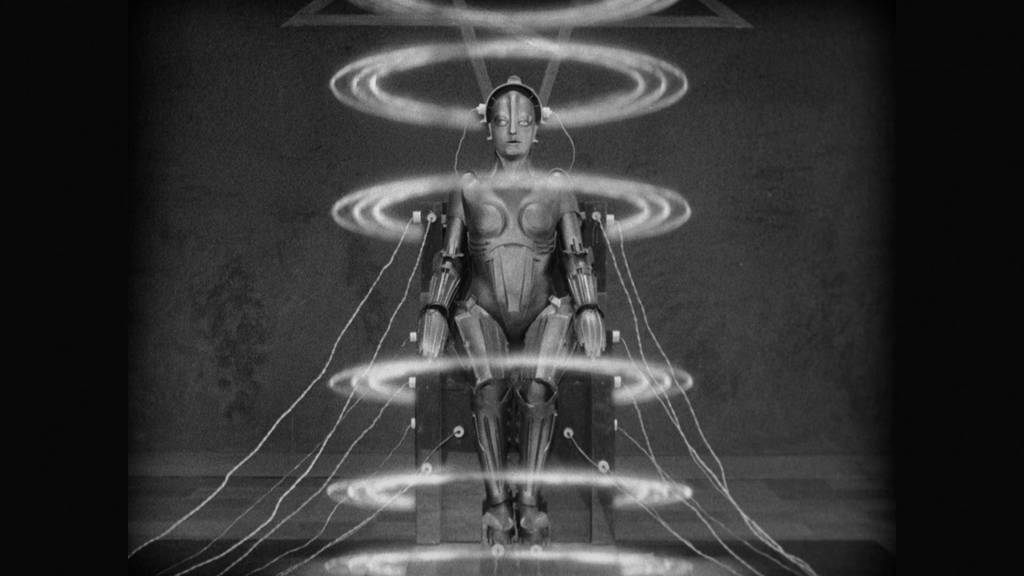
Film Matters: Please tell us about your article that is being published in Film Matters.
Madi Margolis: A posthuman figure like the female cyborg challenges traditional humanist feminism in ways that make room for theorizing new subjectivities and feminist epistemologies. In my article, I analyze how Fritz Lang’s Metropolis (1927) offers such a vision of the female cyborg. In the film, the cyborg subject, Maria, is a composite of machine and human—both physical, dependent on the corporal mixing of flesh and machine, and mental, combining human emotional with robotic programming. By viewing this film alongside critical theory, we can understand cyborg-Maria as a subversive, hybrid character. Accordingly, I conclude in my article, the cyborg as a figure subverts and fragments the coherency of narratives that present gender, technology, and identity in monolithic terms, helping us envision new possibilities.
FM: What research and/or methodologies do you incorporate in your article?
MM: In my article, I begin by building off the foundational work of Donna Haraway in her “Cyborg Manifesto.” I employ her definition of the cyborg to understand Maria as having a more ambiguous and hybrid identity than merely robot. Doing so allowed me to investigate gender, feminism, and technology in Metropolis. I also apply some more contemporary theories, like posthumanism, postmodernism, and queer theory, to see how the film holds up under the scrutiny of modern-day critical theory and explore what new conclusions it yields.
FM: Describe the original context for/when writing this article while an undergraduate student.
MM: I wrote the first draft of this article during my junior year as the final paper for the class Approaches to International Cinema. At first, I was focused more on Metropolis’s significance to world cinema but shifted my focus to its representation of the cyborg and its portrayal of gender and sexuality. In my senior year, I expanded that essay to create my senior thesis, an analysis of cyborg feminism. It become the first section of my thesis and inspired me to include other films like Blade Runner and Ex Machina.
FM: How has your department and/or institution supported your work in film and media?
MM: Even though I majored in English, I always got to be involved in film studies, particularly through Barrett, the honors college at Arizona State University. I had the opportunity to take film classes ranging from horror film to crime film. Most importantly, through Barrett, I got to do a senior thesis, and I chose to do it in film studies. Having the chance to do academic work outside my major for a full year was such a unique opportunity and gave me a taste of the field of film studies.
FM: How have your faculty mentors fostered your advancement as a film scholar?
MM: I was lucky to have three great mentors while working on this article. Dr. Ana Hedberg Olenina initially encouraged me to write this essay, then helped me pursue publication. My thesis director and second reader also helped me refine my ideas and my essay. They all encouraged me to go farther in my research, reach for less obvious conclusions, and write many more drafts than I would have on my own. Because of them, I have the confidence to continue my studies next year as a master’s student.
FM: How has the Film Matters editorial and publication process impacted the development/evolution of your article?
MM: Editing my paper for publication through Film Matters has helped me create a more complete, more complex essay. My paper started out around 2500 words, but because the preferred publication length was longer, it encouraged me to expand my essay, almost doubling the length. In doing so, I had to write more in depth, go beyond the obvious, and explain myself more fully. I found my argument in those smaller, specific details, which led to a better final article.
FM: What audience do you hope to reach with your Film Matters article and/or what impact do you hope it has on the field of film studies?
MM: I hope my article gives a new perspective on a classic film. Applying modern and contemporary theories to old films brings them new life, and a film as rich as Metropolis has just as much to say today as it did when it was first released. I also hope my article brings attention to posthumanism in film, since it is a relatively new field but full of possibilities.
FM: What are your future plans?
MM: Next year, I will return to Arizona State University to get my master’s in English Literature. Afterward, I plan to pursue a career in book editing and publishing.
Author Biography
Madi Margolis is a senior at Arizona State University. She is studying English literature and film, and next year she will get her master’s in English. She served as the nonfiction editor of the literary magazine Superstition Review, and she is a tutor at the Barrett Writing Center.







































